- Home
- Shirley Jackson
Let Me Tell You: New Stories, Essays, and Other Writings Page 6
Let Me Tell You: New Stories, Essays, and Other Writings Read online
Page 6
“Sure,” her son said, “sure,” and bent his head over his pudding.
—
After considerable hesitation, and without quite knowing why, Mrs. Spencer brought herself reluctantly to speak to her husband. She put her slim dessert spoon down on the edge of her plate, touched the handle of her coffee cup, and said, not raising her eyes, “Harry, I’m worried about something.”
“Money?” He looked up, concerned. “Money, Margaret? Surely there’s no need—”
“No.” She smiled, a little. “Not money, Harry. No, I’m worried about these people, the ones who have just moved into town.”
“The Oberons?” He was puzzled.
“You know them?”
“Sure,” he said. “Joe and Rosie. They’ve been in the bank. What worries you about them?”
“They’ve been using my name. Nothing serious, of course, and I’m sure everyone around town knows me well enough to recognize the kind of people I know, but they told Mr. Sanson at the market that they were friends of mine, and today I was disturbed when the florist just happened to mention that Mrs.—what is the name? Oberon—was buying white roses because they were my favorite flower and she was expecting me to call—”
“You ought to, as a matter of fact,” Harry said. “Common courtesy.”
“But I don’t even know them,” Mrs. Spencer said.
“If they’re friends of your sister’s—”
“Really,” Mrs. Spencer said. Her fingers tensed on the handle of her coffee cup. “Harry,” she said, then stopped. Finally she said, “If I call on them, then they’ll expect to visit here.”
“Why not?” Harry said. “You could buy her favorite flowers. They are very pleasant people, anyway.”
“Introduce them to my friends?” Mrs. Spencer was astounded. “My friends, Harry?”
“Then do as you think best,” Harry said slowly. “I just thought they were very pleasant people.”
Mrs. Spencer lifted her chin regally. “I do not call on people who capitalize on my name,” she said.
Harry glanced up, sardonically. “It’s my name, too,” he said, “and I’m honored.”
—
Pamela Worthington was quite surprised, she told everyone, to find that the Spencers had not gone to the Oberons’ housewarming; it was certainly the party of the summer, although probably the Oberons would surpass it themselves, the summer being young. At any rate, one would surely have expected the Spencers, of all people, to be there with their old friends.
“I simply couldn’t understand it,” Pamela Worthington said at last to Mrs. Spencer. “You, of all people.”
“We were not invited,” Mrs. Spencer said. “We don’t know the people.”
“Margaret, honestly. Rosie Oberon will simply die when she hears you thought you weren’t invited. She’ll simply die.”
“We were not invited.”
“But, my dear, of course you were invited. Rosie told me herself she was expecting you, and all evening they were absolutely watching for you.”
“We do not know the people.”
Pamela stared. “But Harry introduced me to them, right there in the bank.” Then she stopped, and lowered her voice. “Really, Margaret,” she said, “whatever this is all about, I do think you’re making too much of it. I don’t know what they ever could have done to offend you.”
Mrs. Spencer snapped her pocketbook open, and then shut, with finality. “Furthermore,” she said, “I do not want to know them.”
“It’s your business, after all.” Pamela’s tone had grown definitely colder. “I always knew you could carry a grudge, Margaret, but I do think that in this case you’re just carrying one too far. Rosie Oberon is one of the sweetest people I ever met, and I just don’t see how it’s possible to carry on a feud with her.”
Mrs. Spencer turned away. “I said I do not know the people,” she said. “That should be enough for any of my friends.”
“Maybe,” Pamela said, perhaps not quite loud enough to be heard, “maybe you don’t have that many friends to spare.”
—
The blossoms fell from the peach tree and were swept up by the boy who did the Spencers’ lawn; dandelions sprang up, Donnie and Irma were released at last from school, the weather turned almost warm enough for swimming. On a Thursday, just two weeks after the Oberons’ first letter had come, Mrs. Spencer was late getting home, held up by a tiresome woman who could not understand why the country club dances had to be kept small and exclusive and thought an important committee meeting was the place to argue about it; people should be more discriminating, Mrs. Spencer had been telling herself crossly all the way home; after all the work we’ve done to keep things nice, someone always turns up without any appreciation or understanding. Because she was angry and in a hurry she ripped her stocking getting out of her car, and that meant she would have to change stockings before dinner, and that meant she would be even later; almost running, she went quickly into her house. Surely one might get by without these petty irritations, she was thinking.
“Dorothy?” she called. “Dorothy?”
The high school girl who watched over Donnie and Irma in the afternoons when Mrs. Spencer had her committee meetings and her book club meetings and her Wednesday Club meetings unwound herself from a chair in the living room. She had been watching television, Mrs. Spencer saw with one shocked glance; there was an apple core in the ashtray on the end table. “What?” Mrs. Spencer said, gasping, “Dorothy?”
“Mr. Spencer—”
“Garbage in my living room? Where are the children?”
“They’re not here,” Dorothy said. Carefully, daintily, she took up the apple core. “I’ll wash the ashtray if you like,” she said sweetly.
“Watching television?”
“I only stayed around,” Dorothy said, giving Mrs. Spencer one level, rude stare, “because Mr. Spencer asked me to. He said to tell you that he had taken the children out to the picnic. He said to tell you that they would be expecting you to join them when you got back. That,” said Dorothy, “is what I stayed here to tell you.”
“A picnic?”
“Everyone in town is going. At the Oberons’. I’m going too.” For a moment Dorothy’s voice trembled with adolescent outrage. “I could even be late,” she said, “just because I wanted to do you a favor.”
“Really, Dorothy.” Mrs. Spencer lifted her chin. “I don’t need people doing me favors. You could have left a note.”
“Mr. Spencer asked me to, and I could have been at the picnic a long time ago.” Dorothy stopped, schoolbooks and jacket in her arms, one hand fumbling for the front doorknob. “My mother says I don’t have to babysit for you anymore if I don’t want to,” she said, with enormous dignity. “So I just guess I won’t be back anymore.”
“Just as you please, Dorothy,” Mrs. Spencer said, but the door slammed behind Dorothy and her words trailed off. The house was very still; Mrs. Spencer’s planning had somehow never taken into account the fact that someday she might come home and not find Harry and the children. Uncertain, she turned toward the stairs, thinking to go and change her stockings, and then hesitated. She had told Harry and the children, had she not, that the Oberons were socially unacceptable? This was just like her sister, this pushing and climbing and refusing to take no for an answer, until nice people were forced to visit out of sheer weariness; they will be making a great fuss over Harry and the children to get at me, Mrs. Spencer thought; I must go at once and put a stop to it.
Running again, not even sparing time to change her stockings, she went out to her car. It’s like everyone back home, she was thinking, picnics and last-minute invitations, and everything confused and grimy and noisy, taking people away from their homes and their dinners without ever stopping to think how inconvenient it might be for the orderly routine of their houses. Mrs. Spencer remembered, with a little shiver of fury, the troops of laughing friends her sister was always apt to bring home, always, somehow, when the house was
freshly cleaned and things put in order.
Potluck, Mrs. Spencer thought, as though it were a word from a nightmare. A picnic at dinnertime. Children being fed all kinds of things they shouldn’t have. Grown-ups laughing and drinking and probably never getting anything to eat until all hours. People trampling through the house, wrinkling rugs, upsetting ashtrays, pressing into the kitchen to help make a salad, dropping cigarettes, putting glasses down on polished furniture, making noise. It’s vulgar, Mrs. Spencer whispered fearfully to herself, vulgar and untidy and nasty.
She did not often drive along the river road; many of the houses along there were only shacks set by the water, and Mrs. Spencer had been on a committee that stopped the people living in them from throwing their garbage into the river. She had to follow the main highway to the edge of the town, and then turn off, and as she came to the entrance of the river road she slowed down, watching for the abandoned, derelict gas station that marked the turn; it’s just like them to live along here, she thought, just like them.
She could hear the sound of a waterfall through the still night, even over the soft sound of her car. She had not perceived how dark it had grown until she realized that the moon was rising; under other circumstances she might have slowed down briefly to admire the light across the water, as she admired all things done in an orderly manner, but tonight she had to hurry. The thought had crossed her mind that one of these days she might open her front door to find the Oberons and their friends crowding in for a visit, expecting hospitality in the style of their own; she could not get Harry and the children away quickly enough.
Driven by the thought of the Oberons crossing her trim threshold, Mrs. Spencer drove faster. The Oberons’ house on the river was not far past the waterfall, but tonight—perhaps because of the darkness growing steadily along the road, with only an occasional glimpse, now, of the moon through the trees—it was difficult to find. Once, Mrs. Spencer slowed down at a curve in the winding road, thinking she heard voices singing, and saw lights through the trees, but when she stopped her car there was nothing but silence, and she drove on.
The Oberons’ house was set back from the road, down the slope to the river, and only a ramshackle fence post marked the turnoff that served as a driveway; peering through the darkness, Mrs. Spencer went on, and then found herself without warning on the broad highway that marked the end of the river road on this side; this highway would only lead her back home, alone. She had come too far, and must turn and go back. As she started back, she decided that she had taken enough. Tomorrow she would tell Mr. Sanson at the store, and Mrs. Babcock, and the florist, and all the rest that the Oberons were not to be trusted. “They used my name without any authorization from me,” she would say. “I wouldn’t let them owe me money; you may be sure that Mr. Spencer and I do not accept responsibility.”
The winding road was very dark now, and she had to turn on the car’s headlights; all they showed her were trees and quiet leaves. Far away was the sound of the waterfall and then, even more distantly, laughter. Mrs. Spencer stopped her car again and listened. She thought she could hear what might be children shouting, even one high voice that could have been Donnie’s, and above the thin noise of the children was music, perhaps a radio, with that peculiarly clear sound that music has near water. She sat in her car, head bent forward intently, and heard—she was positive—Harry’s voice singing. “Oh, my darling,” he was singing, “oh, my darling, oh, my darling Clementine,” and the children’s voices joined him, rising in glad disharmony, “Oh, my darling Clementine…” and the laughter went on.
Unsteadily, Mrs. Spencer opened the door of her car and got out, the stones of the road hard and rough under her thin high-heeled shoes. Somewhere along here, she thought, and moved, stumbling, to the side of the road. Even if she could not see the lights of the house through the trees, the driveway must be along here somewhere, and time was pressing; she could not, could not, endure to hear her husband singing and her children laughing somewhere down there at the Oberons’ house.
There was a fence going along the side of the road, almost certainly a fence that led to the post that marked the driveway, and she took hold of the top rail—she had forgotten her gloves—to steady herself as she followed it. Even with the car’s headlights shining it was dark on the side of the road, among the trees, and the distant singing and laughter faded sometimes until it was only the sound of a very soft breeze going through the leaves. Walking almost blindly, Mrs. Spencer made her way along the fence, slipping into a ditch once, almost losing a shoe in a pile of dead leaves, straining to see lights down by the river. Then, turning at a curve in the road, she was halted; the fence ended in a tangle of fallen boards, and there ahead was the derelict gas station, and the other road home.
I’ve been going the wrong way, she thought, realizing that there were tears on her face, I’ve walked all this time the wrong way; the way in is somewhere behind me. Groping, she found her way back to her car, and sat for a minute on the seat, the door open beside her. When she sat still she could hear the singing distinctly, “Oh, my darling, oh, my darling Clementine,” and a voice—surely Irma’s—shouting, “Popcorn! Popcorn!” I’ll have to turn around again, she thought; I must have missed it somehow. Her shoes were ruined, she knew, and it was just as well that she had not changed her stockings; her hands were filthy and scratched from the fence; she knew that her hair was draggled and her lipstick worn away. All of this the Oberons will pay for, she thought. The Oberons will suffer for every single bit of this; I’ll have Harry run them out of town tomorrow; you just wait and see, she told the Oberons silently, you just wait and see what I am going to do with you.
She started the car then, fired with anger, and turned around by the gas station and started back along the road, driving very slowly and close to the side of the road. When she came to the spot where she had heard the singing she went even more slowly, her head partly out of the car window. It was possible—considering the haphazard Oberons, it was even probable—that the fence post that marked the driveway had been allowed to fall down, but even so, the driveway ought to have been visible as an opening between the trees. From far away she could still hear the laughter and the singing, as though the guests wandered now all along the river, perhaps in boats, going up and down the river and singing. If those people have put my Donnie into a boat, she thought fiercely, they’ll have to account to me—and found herself again at the end of the river road where it joined the other highway home.
Why can’t I find it? Why can’t I find the house where the Oberons live? Everyone else has gotten there all right. No, she thought, sitting and staring at the streetlights going along in order toward her home, no, it isn’t possible.
Then, beginning to feel frantic, she turned her car quickly and drove back along the road until she came again to the other end, to the abandoned gas station, and, turning again, back once more to the lighted highway. Once, she stopped, hearing first only silence and then, far away, the voices singing and the laughter. It seemed to her that she had spent hours, perhaps years, searching up and down a dark and empty road, following the distant merriment, never able to find a way to get closer to it. At last, tired and worn, tears drying on her cheeks, she accepted the highway home and left the river road behind. They will be waiting for me at home, she said over and over, they will be there waiting for me, they will have been waiting all this time.
The town was deserted; only an occasional light showed on a porch or in a hallway, as though most people had gone off by daylight, forgetting that it might be dark when they came home. No one was walking on the sidewalks, and Mrs. Spencer wondered if the movie theater and the restaurants and the drugstores and the bars downtown would all be empty, closed and dark, because all the town was down by the river laughing and singing and dancing. I’m the only one who didn’t go, she thought with dismay; they all went off and left me behind.
In her haste she had not left any lights on in her own house, and it was dark an
d forbidding as she drove into the driveway and walked up to the front door. No one was waiting for her. She looked eagerly, pointlessly, through the downstairs rooms, calling “Harry? Donnie? Irma?” into the silence, then sat tiredly on the bottom step of the staircase. More than anything else, more even than welcoming her family home, she wanted to shower and change, make herself clean again, and yet she had not the will to get herself upstairs; I’m the only one who didn’t go, she thought again.
At last she moved, alert, hearing suddenly the sounds of movement; cars going down the street, people walking, voices calling to one another. They’re back, she thought, everyone has come home again; I must hurry and change before they get here. Harry and Donnie and Irma must not find Margaret Spencer sitting bedraggled on the bottom step of her own staircase; she must be neat and ready for them, and then, running up the stairs, she realized that they would be coming home dirty and sticky and perhaps wet from the river, perhaps tracking mud across the white doorsill, putting grimy hands on the stair rail, bringing their filthy shoes into the living room, and she sighed irritably. It’s too much, she thought; it’s more than I can stand. I spend my whole life keeping things nice for them, and what thanks do I get?
She heard Harry’s car pull into the driveway, and doors opening and closing.
Then, irrepressibly, Irma giggled and said in what was almost a whisper, “Oh, my darling Clementine,” and Donnie began to laugh and then Harry was laughing too. “Oh, my darling Clementine,” they said to one another, as Harry unlocked the door, and then they were all inside.
Watching them helplessly, angry and bewildered in the face of their joyful, happy laughter, Mrs. Spencer could only think, It’s too much, it’s too much; I spend my whole life keeping things nice for them, and this is the thanks I get.
It Isn’t the Money I Mind

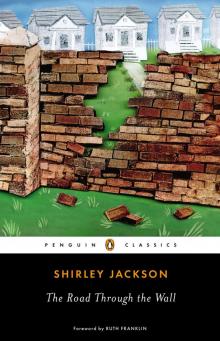 The Road Through the Wall
The Road Through the Wall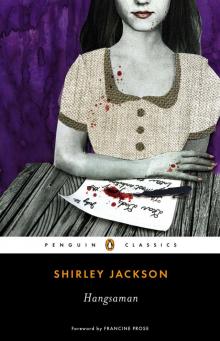 Hangsaman
Hangsaman Come Along With Me
Come Along With Me The Lottery
The Lottery Just an Ordinary Day: Stories
Just an Ordinary Day: Stories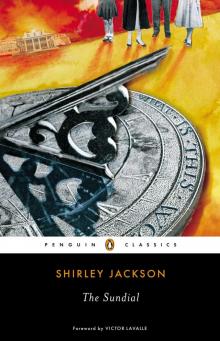 The Sundial
The Sundial Dark Tales
Dark Tales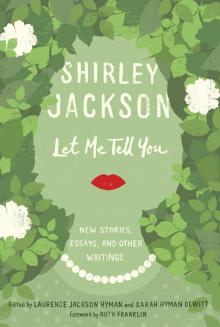 Let Me Tell You: New Stories, Essays, and Other Writings
Let Me Tell You: New Stories, Essays, and Other Writings The Haunting of Hill House
The Haunting of Hill House The Bird's Nest
The Bird's Nest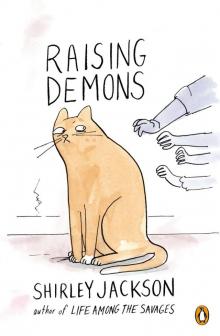 Raising Demons
Raising Demons We Have Always Lived in the Castle
We Have Always Lived in the Castle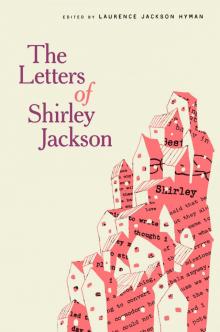 The Letters of Shirley Jackson
The Letters of Shirley Jackson The Missing Girl
The Missing Girl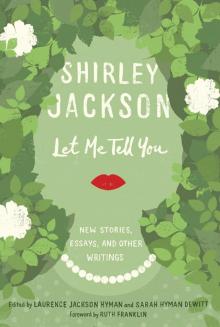 Let Me Tell You
Let Me Tell You